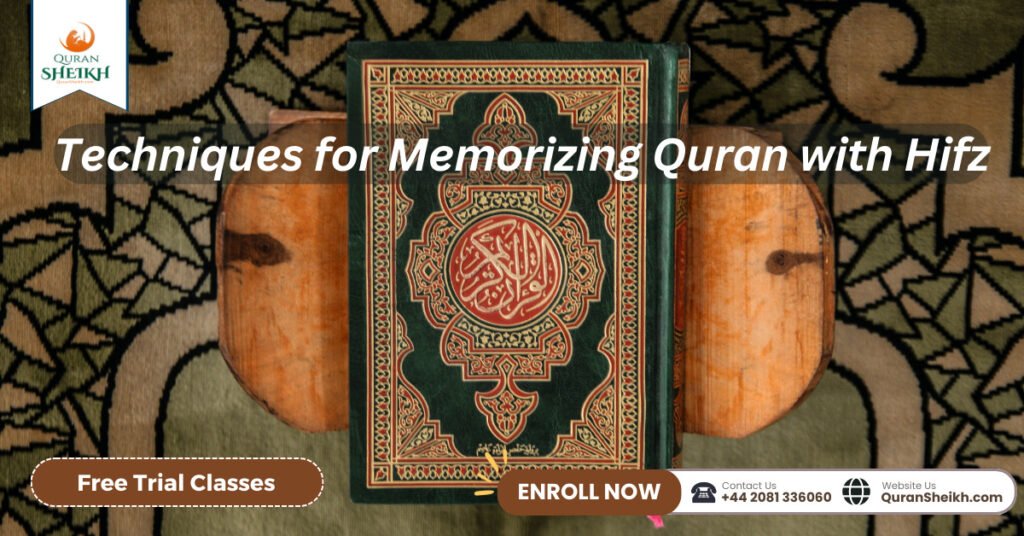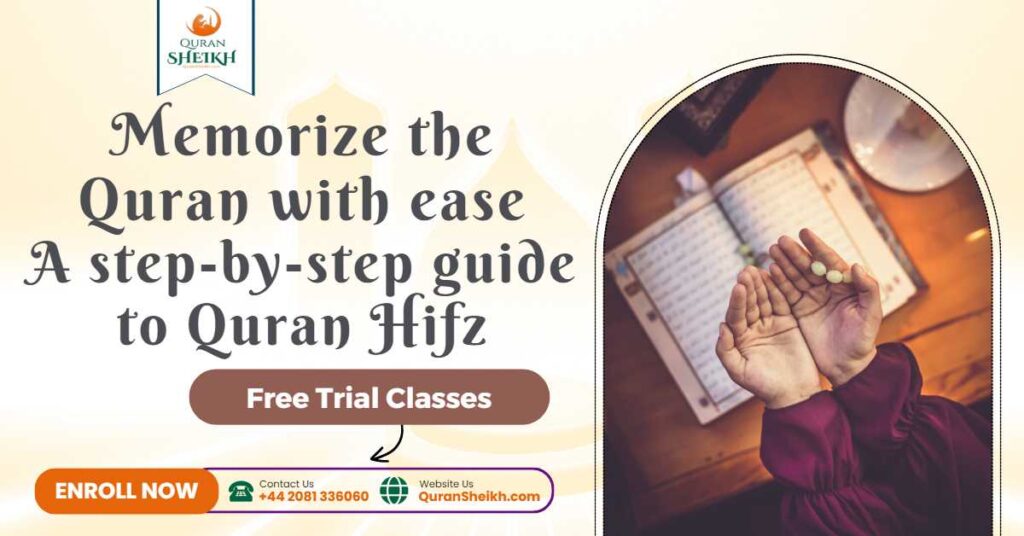Recitation of the Quran is significant in Islam as it is regarded as the holiest text. Hifz, memorizing the Quran, is thought of as a very important achievement that involves spiritual and personal advantages.
That is why, over hundreds of years, Muslims are devoted to hifz memorization of the Quran.
This article examines Quran Hifz: history, significant aspects, memorization techniques, gains, challenges, and assistance relating to the project. It also gives knowledge to those who would like to take this path.
For the best results, use our recommended Quran memorization apps alongside your daily lessons.
Join thousands of Muslim Families who love learning Quran, Arabic and Islamic Studies from the comfort of their Homes.
What is Quran Hifz and Why is it Important?

Defining Quran Hifz
The act of memorizing the entire Quran which is regarded as a holy book in Islam is called Hifz. The Quran remains the Muslim’s most effective guide to comprehend Allah’s teachings. Recitation and memorization of it is important so as to improve their religious understanding. So, they should perform this duty.
The significance of Hifz in an Islamic tradition
In Islam, Hifz plays a special role as a means of getting close to Allah. Memorizing the Quran has been seen as a form of worship, which purifies the spiritual and mental states. Muslims are particularly encouraged to memorize and recite from memory while praying. In Muslim society, people who had memorized the Quran were greatly respected.
The History and Significance of Quran Hifz

The Origins and Spread of Quran Hifz
Hifz or Quran memorization practice can be traced back to period of prophet Muhammad and it is said that prophet Muhammad also excelled in it.
The custom got spread throughout the Muslim countries as scholars and students worked for memorizing the holy word.
These days, there is a huge number of inhabitants categorized as a Hafiz (the one who has memorized Quran) all over the globe.
Notable Hafiz and Their Contributions
Some of the famous hafiz include imam bukhari, imam muslim, and imam ahmad. The above scholars are noted for their mastery of Quranic memorization and for providing great contributions towards Islam studies and law.
The loyalty Muslims have for the text (the Quran) and its teachings has pushed generations into reading, absorbing and memorizing it.
Quran Memorization Course Online with an Arab teacher with 30% Off
Techniques for Memorizing Quran with Hifz

Some benefits of different memorization techniques
Some of these techniques include; repetition, visualization and use of mnemonics in learning Quran Hifz. All these methods have their own strengths and many Hafiz employ multiple of them in order to improve memory.
How to Memorize Quran Verses with Hifz
Consistency in reciting is an important way of learning and memorizing Quran. It is recommended that you divide the Quran into segments to sharpen your remembrance skills; focus on one part at a time.
Besides, getting a mentor or teacher to guide you through memory can be very valuable.
The Benefits of Memorizing the Quran with Hifz

Spiritual and Personal Benefits of Hifz
The advantages of memorization on the Quran are numerous by considering both religious and personal perspectives. It is believed to increase faith, improve attention or memory as well as understanding of Islam. Moreover, Hifz constitutes a means by which the Muslims approach Allah in order to get blessings there.
Social Benefits of Hifz in Muslim Communities
Hifz has also its social benefits in Muslim communities. Given this regard, Hafizs are respected in the society and also invited by Muslims to recite the Qur’an on rituals.
Moreover, memorization of the Quran is considered as means of preserving it and handing it over to the subsequent generations.
Challenges and Tips for Maintaining Quran Hifz
Some of the common challenges in hifz and how to overcome them
Hifz of the Holy Quran stands as a great achievement that can be made by any Muslim.
There are a number of challenges that go with this process of Quran memorization. These difficulties encompass lack of motivation, distraction and sometimes forgetting occasionally. These are facing by hafiz and those who studying qur’an too. Defeating the obstacles requires strong will-power, diligence, and patience.
One can fight the problem of no motivation by following a timetable and abiding to it. For example, you need to set aside certain hours during a day for Hifz so that you will not forget or miss out on it.
Avoid all kinds of distraction by picking one spot and avoiding any distractions around you. At last, get rid of forgetfulness while trying to store in mind the Quran through constantly revising it and frequently going back to the hard portions in the Quran.
How to keep a consistent Hifz routine
The secret of success in memorizing the Quran lies in keeping up with a steady Hifz practice. Here are a few simple tips for staying on track:
- Set realistic targets then plan small actionable steps towards their achievement.
- Monitor small wins along the way.
- Build a network of positive connections, who will encourage and push you to keep going.
- Incorporate Hifz into your routine on daily basis.
- Look for other students with whom you could study, revise, and practice.
Memorization Programs and Resources for Quran Hifz
Hifz Programs and Institutions Around the World
Memorizing the Quran is a basic element of Islamic education that is why numerous Hifz institutions exist globally.
Institutions renowned for their Hifz studies include: (i) The Islamic University of Madinah in Saudi Arabia, (ii) Darul Uloom Deoband in India, and (iii) Al-Azhar University in Egypt.
These institutions offer extensive Hifz programs which encompass the recitation, and also provide study in Quranic Tafsir, Hadith, and Fiqh respectively.
Memorization online resources and tools
In the present digital age, there are plenty of online resources and tools that help the Muslim community in their quest of learning the Quran by heart. This incorporates Quran memorization applications, online hifz classes, and Quranic hifz software.
They are great and easy to use Quranic tools, which enable Muslim believers study Quran by themselves just online or at any place of one’s comfort.
Hifz and its role within Islamic education
The role of hifz and Quranic education in Islamic schools
Hifz is an integral aspect of learning Islam and is one of the most important elements at the Islamic schools. The majority of Islamic schools have Hifz program. The programs are a combination of Quranic memorization and detailed studies on Islamic sciences. Such sciences comprise of Tafsir Hadith. Muslim law.
These projects seek to make their students to fall in deep love to Quran and understand comprehensively the world view of Islam.
Hifz and Islamic Higher Education
The hifz is also a necessary part of Islamic higher education. Many students who are studying Islam at university level may even have memorized the Al-Quran. Hifz is regarded as an essential qualification for higher learning in disciplines like Islamic Law, Quranic interpretations, and Hadith Sciences.
Inspiring Stories of Quran Hifz and Its Impact on Muslim Communities
Personal Stories of Hafiz and Their Journeys
Many stories about Hafiz and their effort of memorizing the Quran are very inspiring. In most cases, these stories demonstrate how Quranic memorization is able to change the life of a person, starting from falling deeply in love and being connected with the Quran to improvement of one’s own character, as well as relations towards other people.
Hifz memorization programs and their community impact
Hifz memorization programs affect Muslims in various corners of the globe. Firstly, these projects foster strong attachments between every participant who grows to love and respect it as their own book; secondly, they make people come together in order to create a group spirit and thus unite people.
Muslim students in hifz programs come from all communities and thus help create unity between people who would usually not be friendly with each other. Hifz memorization courses can play the role in passing on Islamic History and culture for the coming generation’s reference.
Finally, Quran Hifz is an obligation characterized by discipline, consistency, and belief. Hifz of Qur’an is an invaluable spiritual and personal attainment with profound blessings on individual as well as social lives.
One can join it by using the conventional curriculum or even via the internet. These are just some of the means of starting the path of belonging to an Islamic tradition that has continued unchanged for over 14 centuries.
What is the history behind the Quran?
It is the fundamental religious book for the followers of religion Islam who believe that it was revealed to the prophet Muhammad by Allah through Angel Jibril for twenty three years starting in 610 C.E. Muslims consider the Quran as a last message given by God which cancels all other books of scripture given earlier.
The Quran is the message that Allah divulged gradually, usually in answer to issues or occasions raised by Prophet Mohammed himself. Thus, Muhammad recited such revelations through his companions who in turn committed them to memory and wrote them on whatever was available.
Then after Muhammad’s demise in 632CE, Muhammad’s companions edited and assembled the Quran into one manuscript. The Muslim world then became in possession of this manuscript and duplicated it across the Middle East. Many Muslims had learned the Quran by heart while the Quran was being written down in its recorded version; and this practice is still common whereby Muslim memorize the entire Quran by heart.
There are 114 chapters, also referred to as surahs, and these are ordered from shortest to longest. The surahs are also further divided into units called verses or ayahs. The language of Quran is Arabic and its beauty and eloquence are acknowledged.
The Quran is a complex book, and it covers a wide range of topics, including:
- The oneness of God
- The purpose of creation
- The importance of faith and obedience to Allah
- Moral and ethical values
- Laws and regulations
- Stories about prophets and other famous people
In short, the Quran remains the paramount source of law and guidance from which every Muslim everywhere draws instruction.
Can I become Hafiz alone?
You can become an individual hafiz on your own; however, it will be demanding and require concentration (Learn techniques to improve concentration for memorization), discipline (Discover how discipline supports Quranic memorization), and consistency to succeed. These are some keys to help you on your journey:
- Set realistic goals. Do not attempt to learn too much at once. Begin with a modest objective like recalling one or two verses every day. Once you have got that down, and then slowly start raising your goal.
- Look for a quiet place that one would not get interrupted when studying.
- Various memorization techniques. Some people benefit when they read some verses in the Quran out loud and other benefit when listening to an audio recording of the Quran. In addition, you can consider writing the verses as well.
- Review periodically, everything that you have memorized. Mnemonics help in retaining the information.
- Do not hesitate to reach out for the help you need. You can seek help on any verse or passage that you find difficult from your friend, relative or a Quran instructor.
Learning Quran by heart is a journey which must be undertaken together with buddies. For instance, working under a teacher or even studying next to some students can give you all support, motivations, and responsibility as well. However, you may go ahead and achieve this on your own. It simply requires a little bit of diligence and passion.
Do not forget that first you should have heart-felt desire to memorize Quran and then should pray for Allah to assist you in every step.
How many types of Quran recitation are there?
The Quran recitation comprises of seven different styles known as the Qira’at. They had been communicated by the prophet Muhammad (peace be upon him) to the companions and have remained preserved during their heritage for generation after generation. The Qira’at are divided in accordance with various Arabic dialects that existed during the period of the Prophet and each Qira’at has an individual way of reciting and pronunciation.
The seven Qira’at are:
- Nafi’ al-Madani
- Ibn Kathir al-Makki
- Abu Amr al-Basri
- Ibn Amir ash-Shami
- Asim al-Kufi
- Hamzah al-Kufi
- Al-Kisa’i
Besides these seven primary Qira’at, there are also supplementary recitations called Shaz. They are lesser known recitations in comparison to seven basic Qira’ats however; it is believed that these recitations are also genuine and correct.
Each and every Qira’at is regarded as valid with none being superior to the other. Muslims have freedom to use the chosen Qira’at; in fact, most Muslims recite the Quran through use of different Qiraʼat.
Diversity of the Qira’at proves that Arabic is enriched with its colorful variations, while at same time, reminding us of the fact that the Quran should be recited and comprehended in an easy and comprehensible way for every single person.
Quran is a living book and must be recited and understood by people of all levels of humanity. This is why there exist various forms of Quranic recitation that are distinguished on basis of their modes and articulations.
Qira’at (seven recitations styles) are seven different types of glasses through which we can look at Quran. The significance and charm of Qur’an are brought out well by each qira’at in the different dimensions. Through our recitation of several Qira’at during the Quran, we discover more meaning and depth into its message.
It is like a mirror as well as the Quran. When we read the Quran, we can visualize our own self and the surrounding environment more clearly. The qira’at resembles various angles from which a vision can catch the reflection of a mirror. For instance, by reading the Quran differently, which is called Qira’at; we can have the chance to explore our self and our place in the universe.
Allah gave us the Quran as a gift which we should value and utilize in the form of Qira’ats [plural of qira’a]. By reciting the Qur’an in diverse Qira’at, we can link with the Qur’an, feeling its beauty and wisdom, as if it were whole.
Best Quran memorization program with qualified Arab tutors and get 30% OFF, Quran classes for Kids
Quran Memorization Course – Free Trial Lesson
Sign Up Today

FAQs About Quran Hifz
Here are some common questions and answers about Quran Hifz:
What is Quran Hifz and why is it important?
Quran Hifz refers to the memorization of the entire Quran, word for word, as a spiritual and intellectual achievement in Islam. It is highly respected and brings immense rewards, strengthening one’s connection to Allah and preserving the Quran for future generations.
What is the difference between regular Quran recitation and Quran Hifz?
Regular recitation involves reading the Quran from the text, while Quran Hifz means memorizing it completely and being able to recite it from memory. Hifz is considered a higher level of commitment and is a long-standing tradition in the Muslim world.
How long does it take to complete Quran Hifz?
The duration varies greatly depending on the individual’s dedication, daily routine, and learning ability. Some complete Quran Hifz in a few years, while others may take longer. Consistency, structured planning, and regular revision are key to success.
What are the main benefits of memorizing the Quran with Hifz?
Quran Hifz enhances spiritual growth, discipline, focus, and memory. It deepens understanding of Islamic teachings, brings inner peace, and earns respect within the Muslim community. It also enables one to lead prayers and teach others.
Can I memorize the Quran with Hifz on my own, or do I need a teacher?
While self-study is possible, having a qualified teacher or joining a Hifz program provides structure, motivation, and ensures correct pronunciation and Tajweed. Teachers can help track progress, correct mistakes, and offer personalized guidance.
What challenges might I face during Quran Hifz, and how can I overcome them?
Common challenges include lack of motivation, distractions, and forgetting verses. Overcome these by setting realistic goals, maintaining a daily schedule, seeking support from teachers or peers, and revising regularly to reinforce memory.
Are there online resources and programs for Quran Hifz?
Yes, there are numerous online Hifz programs, apps, and digital resources that provide structured lessons, progress tracking, and access to experienced tutors. These tools make it easier for learners of all ages to pursue Hifz from anywhere in the world.
“How-To” Questions for Quran Hifz
How to start your Quran Hifz journey?
Begin by setting a sincere intention and clear goals for your memorization. Choose whether to start with shorter surahs (like Juz Amma) or from the beginning of the Quran. Seek guidance from a qualified teacher or enroll in a reputable Hifz program for support and structure.
How to create an effective Hifz routine?
Design a daily schedule that includes dedicated time for new memorization and revision. Early mornings are often ideal for memorizing new verses, while afternoons or evenings can be used for reviewing previous lessons. Consistency and short, focused sessions yield the best results.
How to use memorization techniques for better retention?
Employ techniques such as repetition, visualization, and association. Read verses aloud multiple times, listen to audio recitations, and use flashcards or apps to reinforce memory. Writing verses down and reciting them in daily prayers also strengthens retention.
How to track your Quran Hifz progress?
Use a memorization tracker, journal, or digital app to log daily achievements and identify areas needing extra revision. Regularly test yourself or recite to a teacher to assess your accuracy and fluency.
How to stay motivated and overcome obstacles during Hifz?
Stay motivated by celebrating small milestones, joining study groups, and seeking encouragement from family or friends. Make dua for ease and consistency, and remember the spiritual rewards and personal growth that come with completing Quran Hifz.




